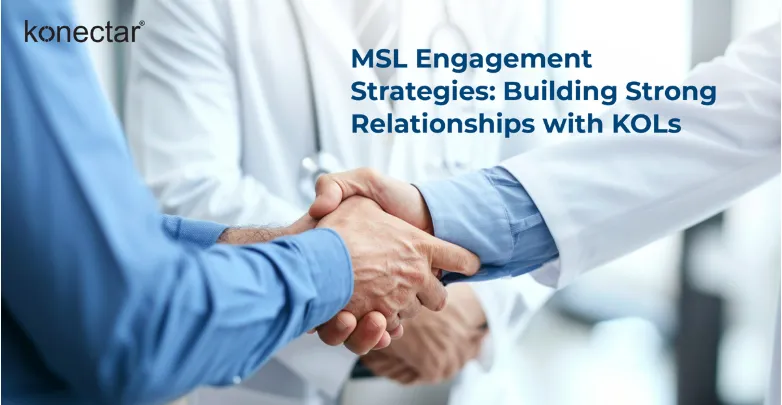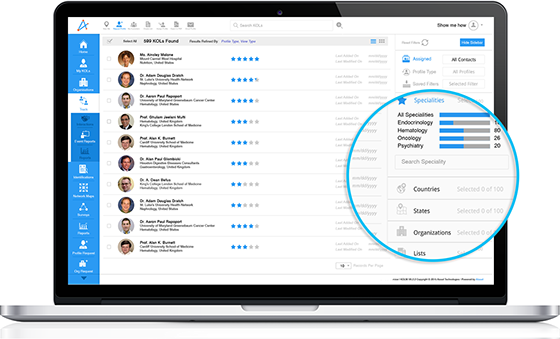04-02-2025
MSL Engagement Strategies: Building Strong Relationships with KOLs

The role of Medical Science Liaisons (MSLs) has evolved into a crucial function within the pharmaceutical, biotechnology, and medical device industries. MSLs bridge scientific research and clinical practice, ensuring that healthcare professionals (HCPs) and Key Opinion Leaders (KOLs) have access to accurate, evidence-based medical information.
As trusted scientific advisors, MSLs engage with KOLs, regulatory bodies, and stakeholders to facilitate medical education, clinical trial collaborations, and data-driven discussions about disease management and treatment innovations.
Unlike traditional sales representatives, MSLs operate with a non-commercial focus, emphasizing medical and scientific discourse rather than product promotion.
In this article:
Why MSL Engagement with KOLs Matters
KOLs are renowned experts in their medical fields and play a vital role in shaping clinical guidelines, treatment protocols, and patient-care strategies.
Engaging with these experts effectively allows MSLs to:
1. Disseminate cutting-edge scientific data to ensure that the latest research informs medical decision-making.
2. Gather critical feedback on clinical trials, real-world evidence (RWE), and emerging therapies.
3. Strengthen credibility and trust between the industry and the medical community, leading to informed patient care.
Organizations adopt data-driven approaches as KOL marketing strategies evolve to maintain strong KOL networks and maximize engagement impact.
Understanding the Role of MSLs in KOL Engagement
MSLs are a vital link between scientific advancements and their real-world application in clinical practice. Their role in key opinion leader engagement is centered on the following:
Bridging the Gap Between Research and Clinical Practice
MSLs bridge the gap between scientific research and clinical practice by translating data into practical insights that help KOLs make informed decisions. They provide evidence-based education through discussions, symposiums, and advisory boards, ensuring that KOLs stay updated about medical advancements.
Additionally, MSLs facilitate clinical trial collaborations, working closely with KOLs to align research findings with real-world patient needs, ultimately enhancing treatment outcomes and driving medical innovation.
Ensuring Scientific Credibility and Compliance
Ensuring scientific credibility and compliance is fundamental to MSL-KOL engagement. MSLs must present unbiased, research-backed information that remains independent of commercial interest, reinforcing their role as trusted scientific advisors.
Adherence to ethical guidelines and regulatory frameworks, such as the Sunshine Act, is essential to maintain transparency and integrity in all interactions.
By upholding transparency in data sharing and scientific discourse, MSLs foster trust with KOLs, ensuring that engagements remain ethically sound and focused on advancing medical knowledge and patient care.
Building Long-Term Relationships with KOLs
By upholding transparency in data sharing and scientific discourse, MSLs foster trust with KOLs, ensuring that engagements remain ethically sound and focused on advancing medical knowledge and patient care.
Maintaining a two-way dialogue is essential, allowing MSLs to share scientific insights and gather valuable feedback that can shape research and clinical strategies.
Additionally, leveraging digital tools and AI-driven analytics enables MSLs to personalize and optimize their interactions, ensuring that engagements are data-driven, efficient, and tailored to each KOL's specific needs and preferences.
Organizations are now incorporating social media KOL engagement and digital KOL outreach into their KOL marketing strategies to expand their reach and foster key leader opinion collaborations.
Establishing Initial Contact
Building strong relationships with Key Opinion Leaders begins with a well-planned and strategic initial outreach. The first interaction sets the tone for future engagement strategies, making it essential for MSLs to approach KOLs with professionalism, credibility, and value-driven communication.
Successful KOL marketing hinges on a combination of personalization, clear communication, and choosing the right channel for outreach. By leveraging KOL networks and digital engagement, MSLs can enhance their initial interactions with KOLs.
Best Practices for Initial Outreach and Introduction
The first impression an MSL makes can significantly influence the willingness of a key opinion leader to engage in future discussions.
To establish a strong foundation, MSLs should:
1. Conduct thorough research on the KOL’s background, including their areas of expertise, recent publications, speaking engagements, and clinical interests.
2. Clearly define the purpose of the outreach, ensuring that it aligns with the KOL’s scientific interests rather than appearing as a generic request.
3. Introduce themselves with credibility, highlighting their scientific background and role in facilitating medical discussions rather than commercial promotions.
4. Communicate the value of engagement, emphasizing how collaboration can benefit the KOL’s research, clinical practice, or broader scientific contributions.
By integrating digital KOL engagement approaches, MSLs can create a more efficient, data-driven outreach strategy that resonates with key opinion leaders.
Personalization in Communication
A personalized approach is key to building trust and demonstrating a genuine interest in KOL’s work. Instead of using generic templates, MSLs should tailor their messaging to reflect the KOL’s specific expertise and recent contributions to the field.
This can be achieved by:
1. Referencing recent research or presentations by the KOL to establish a relevant discussion point.
2. Aligning the conversation with the KOL’s interests, such as ongoing clinical trials, unmet medical needs, or new treatment advancements.
3. Adopting a collaborative tone, positioning the MSL as a scientific partner rather than a representative with a predefined agenda.
4. Being respectful of the KOL’s time, keeping initial outreach concise, clear, and to the point while leaving room for further discussion at their convenience.
Choosing the Right Channel for Engagement
Selecting the most appropriate communication channel is crucial in ensuring a positive response. Key opinion leaders have different preferences when it comes to professional interactions, so MSLs should consider the following:
1. Email communication, which is often the preferred method for an initial introduction, allows KOLs to respond at their convenience.
2. Conference meetings and networking events provide a more natural setting for face-to-face engagement and relationship building.
3. Professional networking platforms, where MSLs can engage with KOLs by commenting on their research or sharing relevant scientific content before reaching out directly.
4. Virtual meetings and webinars, particularly for geographically dispersed KOLs, offer an efficient way to establish a connection and discuss scientific insights.
By combining strategic outreach, personalized communication, and the right engagement channel, MSLs can lay the groundwork for a productive and long-term relationship with KOLs, ensuring meaningful scientific exchange and collaboration.
Developing a Long-Term Engagement Plan with KOLs
Establishing strong relationships with KOLs goes beyond initial contact; it requires a sustained, strategic approach that fosters trust, collaboration, and knowledge exchange over time. A well-structured long-term engagement plan ensures that interactions remain valuable, scientifically meaningful, and mutually beneficial.
MSLs must focus on delivering continuous value through regular interactions, exclusive scientific insights, and opportunities for thought leadership, solidifying their role as trusted scientific partners.
Regular & Value-Driven Interactions
Consistent, high-value engagement is crucial in maintaining KOL relationships. MSLs must ensure that their interactions are purposeful, timely, and aligned with the KOL’s professional interests rather than sporadic or transactional.
To build sustained engagement, MSLs should:
1. Schedule regular scientific discussions to keep key opinion leaders updated on the latest advancements in their field.
2. Offer unique insights beyond what is publicly available, such as preliminary clinical trial results or new research trends.
3. Customize engagements based on KOL preferences, ensuring they receive relevant and meaningful information.
4. Be proactive in responding to key opinion leaders’ inquiries and offering scientific support, reinforcing their role as a valuable resource.
5. Monitor engagement effectiveness, tracking interactions to refine future outreach strategies.
By prioritizing quality over quantity, MSLs can cultivate meaningful relationships that enhance scientific collaboration and knowledge-sharing.
Access to Exclusive Scientific Insights & Clinical Data
KOLs value access to cutting-edge research, emerging clinical data, and unpublished insights that can shape their understanding of disease management and treatment innovation.
MSLs can enhance engagement by:
1. Providing early access to clinical trial updates, including preliminary findings and data interpretations.
2. Discussing real-world data (RWD) and offering practical applications for clinical settings.
3. Facilitating scientific exchange programs where KOLs can engage with other thought leaders and researchers.
4. Co-developing research projects in collaboration with KOLs, fostering deeper engagement and shared scientific contributions.
5. Offering exclusive insights positions MSLs as trusted partners in knowledge dissemination, reinforcing their credibility and strengthening key opinion leader relationships.
Fostering Thought Leadership & Knowledge Sharing
Beyond delivering insights, MSLs should actively empower KOLs as thought leaders in their respective fields. Helping KOLs amplify their influence within the medical community strengthens engagement and creates opportunities for collaborative knowledge-sharing.
MSLs can achieve this by:
1. Providing opportunities for KOLs to contribute to industry discussions, such as speaking engagements at conferences, advisory boards, and webinars.
2. Co-authoring scientific publications, whitepapers, and case studies, showcasing their expertise and research contributions.
3. Supporting KOL-led educational initiatives, such as workshops, online courses, or mentorship programs for early-career HCPs.
4. Encouraging digital engagement, such as leveraging social media or professional platforms like LinkedIn, to share research insights.
5. Facilitating networking opportunities and connecting KOLs with other experts and industry leaders to foster collaboration.
By positioning KOLs as influential voices in medical science, MSLs deepen engagement and contribute to the broader dissemination of scientific knowledge.
Leveraging Digital Platforms for KOL Engagement
Life sciences organizations increasingly use digital platforms to revolutionize their engagement with KOLs. By utilizing social media, AI-driven insights, and the advanced KOL management platform konectar, MSLs can build meaningful and efficient relationships with KOLs in real-time.
Social Media and Digital Engagement
Social media platforms and specialized healthcare forums have become powerful tools for KOL engagement. These platforms allow companies to identify Digital Opinion Leaders (DOLs), engage in real-time conversations, share targeted content, and track engagement impact.
Additionally, virtual conferences, webinars, and online advisory boards provide seamless opportunities for remote collaboration, making KOL engagement strategies more efficient and accessible.
AI-Driven Insights for Real-Time Interaction
Artificial Intelligence (AI) is redefining how companies approach KOL engagement by enabling real-time, data-driven interactions.
Key applications include influence mapping, predictive analytics, and personalized communication. By integrating these AI-driven insights from KOL management platforms, companies can achieve more targeted and efficient engagement while maximizing return on investment (ROI).
konectar: Your Solution for Streamlined KOL Engagement
konectar is one of the leading KOL management platforms that empowers organizations to leverage digital tools and AI to enhance KOL engagement.
With features like AI-driven analytics, real-time engagement tracking, and integrated customer relationship management (CRM) functionality, konectar revolutionizes KOL engagement strategies.
Schedule a demo today and experience the konectar difference.
Final Thoughts
The role of MSLs in KOL engagement is more critical than ever as the pharma, biotechnology, and medical device industries continue to evolve. Establishing strong and strategic relationships with KOLs is more than initial outreach; it fosters long-term partnerships that drive scientific innovation, improves clinical decision-making, and enhance patient outcomes.
By implementing structured engagement strategies, MSLs can create meaningful collaborations with KOLs based on trust, transparency, and scientific credibility.
FAQs
- What is the role of Medical Science Liaisons (MSLs) in KOL engagement?
MSLs are scientific experts who engage with KOLs to provide evidence-based medical information, support clinical trials, and facilitate knowledge sharing.
-
How do MSLs build strong relationships with KOLs?
MSLs build relationships with KOLs through personalized engagement, scientific discussions, and long-term collaboration.
-
What are the key strategies for successful MSL-KOL engagement?
Key strategies include personalized outreach based on KOL interests, regular scientific interactions through advisory boards, symposiums, and one-on-one meetings, leveraging AI-driven analytics to optimize engagement, and ensuring compliance with ethical guidelines such as the Sunshine Act.
-
What are the biggest challenges in MSL-KOL engagement?
Common challenges include maintaining compliance with global regulatory standards, ensuring unbiased KOL selection and engagement, balancing engagement approaches, and managing cross-functional coordination between medical affairs and commercial teams.
-
What are some best practices for initial outreach to KOLs?
Best practices include conducting thorough KOL research before outreach, using personalized communication instead of generic messages, choosing the right engagement channel, and clearly defining the purpose of engagement.





